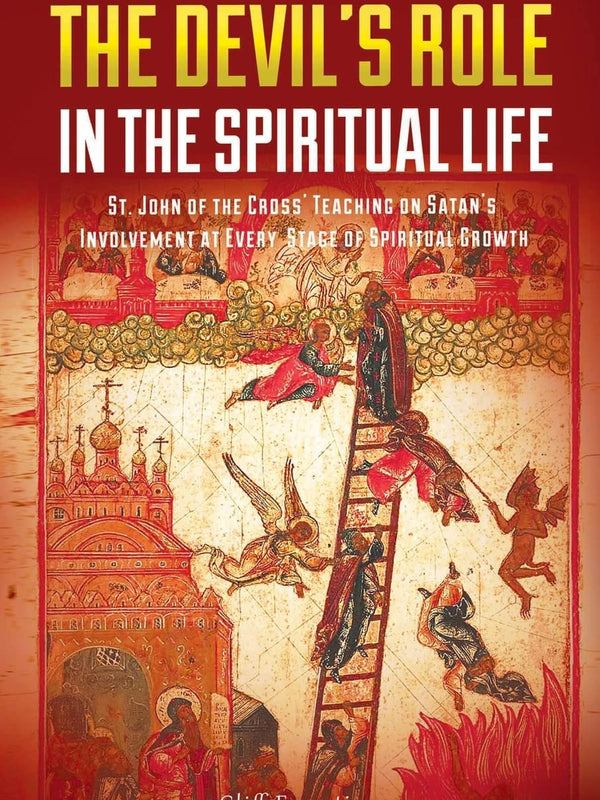If it seems like demonic activity ratchets up during Lent—and especially Holy Week—that’s because it does.
The devil is particularly active against devout souls.
That’s for an obvious reason: They are a threat to him.
He can’t take them out, like he can those who do his bidding (have allowed darkness into their lives), but he certainly can tempt and trouble, befuddle, and confuse, sometimes bodily afflict, causing suffering that turns on him like a flaming boomerang if that suffering is offered to God.
 When it comes to the devout and contemplatives, notes Father Cliff Ermatinger, in a book entitled The Devil’s Role In The Spiritual Life: “Given the inestimable and, nonetheless, hidden good these people bring about for the entire Mystical Body, Satan has a particular fear of and, therefore, interest in their prayer lives.
When it comes to the devout and contemplatives, notes Father Cliff Ermatinger, in a book entitled The Devil’s Role In The Spiritual Life: “Given the inestimable and, nonetheless, hidden good these people bring about for the entire Mystical Body, Satan has a particular fear of and, therefore, interest in their prayer lives.
“He exhausts his resources with them.”
Often, as stated, it is simply a matter of distraction: demons are sent to divert our attention, which they do in various and sundry ways. They’re privy, are dark spirits, notes Father Ermatinger, to the work of Grace in a soul, and they’re frightened of that “to no end.” The effects on them are devastating.
Saint John of the Cross said Satan spends more energy disturbing the prayer of a contemplative than on many people who do not pray.
And yet, in the end, prayer conquers. It defeats him. With love, with Christ, it always wins.
Matters can seem hopeless — beyond daunting. It can be very bad. Jesus was scourged horribly, pierced with thorns, hung on pieces of wood with nails. The pain He endured is inconceivable, no matter how much we try to imagine it. Never has their been greater suffering.
But the result?
Tremendous power. The salvation of billions. The power even to resurrect.
Millennia later, the very Name of Jesus sends demons fleeing.
Another tactic in attacking the devout, notes the book, is false visions and locutions. These are given to “people of mixed intentions” (who don’t have purity of intention), including the “spiritually sensual,” the “spiritually proud,” and those who seek attention — “that is, those who long to stand out, those who are not satisfied with the ordinary path of holiness.”
This is another tactic of distraction—for the false seer as well as followers. “To these people the devil will often simulate visions and other experiences so as to keep them in his service,” notes the priest, who hails from Milwaukee.
Saint John illustrates, notes the author, “how many prophecies and words of God were not fulfilled as expected because men understood them after their own manner… very literally,” whereas “the principal intention of God in giving these things is to express and convey the spirit which is in them… (which) is much more pregnant in meaning than the letter, and is very extraordinary.”
One must look, wrote Saint John, for the essence of a legitimate revelation.
If it says Jesus is coming “soon,” what does “soon” mean? Might it relate more to the coming of His Spirit than a literal arrival, as occurred two thousand years ago?
“It is as though fire were applied to a person’s naked body: it would matter little whether or not he wished to be burned; the fire would of necessity accomplish its work,” argues the author, quoting Saint John. “So too is it with visions and resentments that are good: even though the soul desire it not, they work their effect upon it, chiefly and especially in the soul, rather than in the body.”
One must seriously consider such admonitions, weighing them, though, with discerning faith. Pope Urban VIII once stated, “In cases which concern private revelations, it is better to believe than not to believe, for, if you believe, and it is proven true, you will be happy that you have believed, because our Holy Mother asked it. If you believe, and it should be proven false, you will receive all blessings as if it had been true, because you believed it to be true.”
[resources: books of prophecy]
(Can you imagine what the Virgin Mary could reveal in describing the Crucifixion? She watched Him. She was there at Calvary. As a mother, her suffering was close to His. Curious it is that in Church-sanctioned apparitions and locutions, those sufferings on the Cross have never been thoroughly detailed, that we know of. Let us know if we are forgetting some.)



